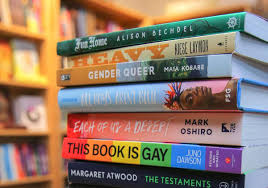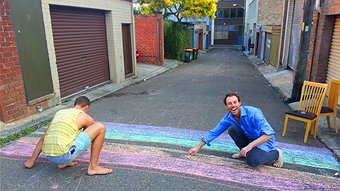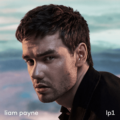
A recent effort has been made to encourage local leaders to ban books in public libraries. States like Texas, Missouri, Louisiana, Florida, and Oklahoma have tried to pass policies that restrict what can be presented in public libraries. Many of these books that are being proposed for restriction are about LGBTQ+ or POC experiences. Some have labeled the books as inappropriate to have in public spaces, even going so far as to call LGBTQ+ representation pornographic. Restrictions on music and literature are not new concepts, with a large wave occurring in the 80s in an attempt to control the morality of music. Similar to today’s rhetoric, the argument was to protect children from morally comprising information. These parallels bring into question the legitimacy of the claims of protection.
These restrictions also severely impact those who rely on public libraries or school libraries for literary information. Removing these books from public libraries and school libraries affects the public’s information on these topics. People who do not have access to private collections or funds to buy their own books are potentially missing out on enriching books that they can relate to. These topics already have limited representation in literature and further attempts to eliminate these types of books might make them vanish completely. Additionally, this could also limit the content that is put into books. If authors are scared of being restricted, they may minimize the information they want to provide to their audience. The biggest issue with these restrictions, however, is the implications for limiting other forms of information. If these sensors on literature are not blocked then there are concerns about what the public has access to. Excluding educational or informational material just because it’s not agreeable to a certain group of people defeats the purpose of public libraries. Based on who is in power and what that group or party agrees with, the availability of information could change so often it would be difficult to keep up.








Like many others who have mentioned here, I also think banning books like this is restricting freedom of speech. I believe that these books are very much needed in public libraries, and that there should be more access to books that those in underrepresented communities can connect with. I think that it is ridiculous that they even went as far as labeling LGBTQ+ representation as pornographic.
Like many others who have mentioned, I also think banning books like this is restricting freedom of speech. I believe that these books are very much needed in public libraries, and that there should be more access to books that those in underrepresented communities can connect with. I think that it is ridiculous that they even went as far as labeling LGBTQ+ representation as pornographic.
I think removing these books is a bad idea. When I was in my adolescence, I would often turn to books to help me navigate some topics that may have been controversial for others. Reading other people’s stories made me feel more connected and helped me reflect on my own experiences. Even if people can’t relate to LGBTQ+ or POC experiences, some people do and need a way to have a connection to stories and do their reflection. Also, it’s beneficial for people who just want to understand diverse experiences more. I think banning these books, intensifies them being controversial in our culture and only hurts the community.
Even though the article talks about public libraries most of the state the article mentions want to restrict certein books public school libraries and most of the LGBQ books they want to restrict, also have very sexual language or other colorful language that not the most appropriate for children and the article is being a bit deceptive by saying public libraries that the only issue with some of these book just they contenting LGBTQ charters
Like most people have mentioned, I echo the sentiment that banning books related to LGBTQ and POC experiences is a restriction of free speech and not a good idea. To me it is another tactic to oppress historically underserved communities. It also seems dystopian like creating your own version of history like 1984 and Fahrenheit 451. I just saw a headline on CNN about Amanda Gorman’s poem “The Hill We Climb” that she read at Biden’s inauguration being banned at a Florida school. There was one parent who asked it be removed from their elementary school who admittedly never read the book but said it contained hate messages. Amanda Gorman has actively spoken out against this as have several other schools in Florida. The issue with her book being able to get banned from a single complaint is how non-threatening the contents of her poem are. People who are open to sharing their experiences of racism, homophobia, or anything related would be banned instantly. As the post mentions, this is incredibly dangerous for what future generations will be learning.
Banning books is the classic start to a dystopian novel where everyone is forced to believe and think the same things and never hold conflicting opinions. While I can understand the position that many of these book banners take and place myself in their shoes, this extreme action of banning books based mainly on fear and lack of understanding is not the way to go about voicing your concerns. For many of these people, anything that conflicts with their worldview or challenges their typical ways of life is inappropriate and personally, I do not believe that that is the best way to think about things. Even for conspiracy theories like flat earth or QAnon, my beliefs have always been about educating, informing, and at most discouraging, but never about restricting or banning altogether. Allowing people to have access to as much information as there exists while teaching them to vet and analyze information before internalizing them, will create more diversity in thought, fewer extremist points of view, and an overall better understanding of the world we live in. To me, what this all boils down to is that we should not be focusing on which books to ban but rather on how we can better teach the general population to utilize the information around them and learn for themselves.
I agree with Wendy, who wrote that “banning some books is like restricting freedom of speech.” It’s ironic that states in the U.S. have efforts to ban books. I’d be willing to bet that the same people part of this effort have probably also declared their right to freedom of speech. It angers me that people think they have the right to what books can be at a public library. As someone who’s part of an underrepresented community, it was sad to grow up and not be able to read things I could relate too. I think it’s especially important to have literature that’s about LGBTQ+ and POC experiences. People should have access to learn about and or explore their identities through books.
I think that public libraries should serve as inclusive spaces that offer a wide range of literature, representing different cultures, identities, and experiences. By attempting to label these books as inappropriate or pornographic, it is clear that those pushing for these restrictions are disregarding the importance of representation and the need for marginalized communities to see themselves reflected in literature. Additionally, it is concerning to think about the potential implications of such restrictions. If we allow censorship to dictate the content available in public libraries, we risk sliding down a dangerous path where access to information is controlled and limited based on the whims of those in power. This goes against the principles of intellectual freedom and the fundamental purpose of public libraries as spaces for learning, exploration, and access to diverse knowledge.
Banning books in general is not right and not a good idea. I believe that any politician or leader should not be allowed to dictate or outlaw what an individual should be able to do, especially in regards to education and knowledge. Books are the types of learning resources that are needed in a country in which education is so expensive, but it becomes the only free or cheap source of education to those who cannot afford higher education or education in general.
Regarding the fact that the books being banned are books about LGBTQ+ and POC experience is incredibly insensitive and ignorant. These factors further the racist and homophobic agendas that some governments teach and force on their citizens or populations, making it incredibly difficult for queer and POC people to live happily.
I don’t think that the banning of books is ever a good idea or beneficial to society in any way. There will always be people who disagree with aspects of literature, and that is their right, but they do not have the right to prevent others from reading that literature and forming their own opinions. While the modern day access to information on the internet might mean that not very many people rely only on public libraries for literary information, it is more the concept of attempting to ban ideas from even being thought about that is dangerous in my opinion. As the article mentions, this banning of books could lead to censorship of other kinds, which could interfere with the free exchange of ideas and ability to develop one’s own critical thinking skills which are so necessary for a functioning free society.
Hey victoria,
I think your most important claim was stated at the end, that censoring things leads only to more censorship, and the implications are more widespread than we understand. However on the topic of the specific books that are being banned, while I don’t think it’s okay at all to ban anything, and I don’t see why censoring POC perspectives is harmful. I don’t agree but I understand the argument for banning the LQBT books since often as opposed to encouraging self-discovery they tend to be more on the manipulative side, not unlike the Christian religious books that manipulate the other way around. Regardless, this article was very well written and your argument is both intriguing and agreeable. Anything that attempts to censor more, as opposed to spark conversations, isn’t in the best interests of anybody.
Hello!
I think book bans are just another example of America moving backwards in time, continuing to limit freedoms. Personally, I don’t think any books should be banned from the public’s viewing.
Instead, books should be graded for the appropriateness of its content, similar to how movies are rated G, PG, PG-13, R, X, etc. I know many school and public libraries will organize books by AR reading level, which is a measure of at what grade level a book is written at. However, the grade level of the novel and the appropriateness of it’s content usually starts to clash in older children’s books and YA novels. For example, on the list of most banned books in 2022-2023 school year includes a novel written by fantasy, romance author Sarah J. Maas entitled “A Court of Mist and Fury” which has an AR level of 5.9 (meaning it’s written with diction that a fifth/sixth grader can understand), but includes explicit, “steamy” sex scenes. Should a 10/11 year old read scenes that are now marketed to adults in bookstores? Maybe not, but it should be up to the parents’ discretion.
Ultimately, the banning of books for themes some individuals find inappropriate like sex, death, illicit activities (drugs/alcohol/etc), teen pregnancy/abortion, POC, and LGBTQ+ is never going to end in a situation in which the most good was promoted. Someone is always going to identify with those themes, and their visibility shouldn’t be revoked because you are uncomfortable.
Banning certain books because a couple of people find them inappropriate or offensive should not even be considered. It’s not that hard to ignore literature that doesn’t apply to you or that you don’t agree with. There are of course books that are inappropriate for younger kids, but that is why there are children’s sections at libraries. It is up to the parent to monitor their own kids, other public library users shouldn’t have to suffer the consequences because of parents’ lack in doing so. Diversity in books in enriching and limiting what is available to the public seems wrong on so many levels. It would be another aspect of giving the state too much power over our freedom.
I feel like banning some books is like restricting freedom of speech. People would have to go through illegal means to get books that they want to read. I think all books should be available and it is up to the person themself to decide if they will believe or support what is written in the book. Books are a great way to learn and people will definitely get a biased world view if they are limited to read only certain books. I think this somehow relates to how some textbooks, specifically history textbooks are written in only the author’s point of view, and how it doesn’t tell the full story of historical events that happened. Although in this situation people don’t even have the opportunity to read the book at all.